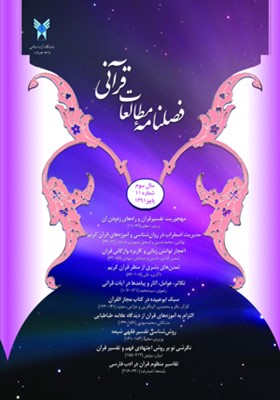نگرشی نو بر روش اجتهادی فهم و تفسیر قرآن
محورهای موضوعی : فصلنامه مطالعات قرآنی
1 - عضو هئیت علمی دانشگاه اصفهان
کلید واژه:
چکیده مقاله :
چکیده در این مقاله دو مکتب مهم تفسیری روایی و اجتهادی و دلایل آنها نقد و بررسی شده و نهایتاً دربارة مکتب تفسیری که میتواند تبیین جدیدی از روش اجتهادی در نظر گرفته شود و مورد تأیید آیات و روایات نیز باشد، سخن گفته شده است که براساس آن معلوم میشود امر تفسیر و تبیین قرآن وظیفهای الهی است که بر دوش مفسرین حقیقی قرآن (انسان کامل)، در درجه اول پیامبر اکرم و حضرات معصومین(ع) و در درجات بعدی علمای ربانی و فقهای واجد شرایط د زمان گذاشته شده هستند، که بدون اتصال به ایشان و استفاده از محضرشان و سؤال کردن و به محک زدن فهم خود نزد ایشان (و نه تنها استفاده از روایات شان)، منظور نظر حقتعالی در آیات قرآن کریم به نحو یقین آور شناخته نشود به طوری که در صورت عدم شناخت و استفاده از محضر این انسان های کامل، گاهی بین برداشت های مختلف از قرآن به دلیل بشری شدن فهم نمیتوان رجحانی قایل شد و چهبسا در بسیاری از موارد موجبات سرگشتگی و گمراهی در فهم از آیات فراهم شود.
Abstract In this paper, two major schools of interpretation,i.e. justifiability and Ijtihad are reviewed and their reasons are criticized and reviewed. And eventually the school of interpretation has been spoken about that can be considered a new explanation of the Ijtihad method and that could also be affirmed by the verses and narrations and on its base it could be clarified that the interpretation and explanation of the Qur'an is a divine duty that has been burdened on real commentators of the Quran (the perfect man), the first and leaders infallible Prophet (PBUH) and then divine scholars and jurists who are eligible for the time being, those that without connection with them and without taking use of their presence by asking them and examining one’s understanding of their sight (and not only use their accounts), the view of God in the Holy Quran would not be clarified as the great certainty. So that in the absence of their cognition and without using their views, one cannot sometimes get a preference among diverse concepts of the Quran that is due to the humanization of the realization and it often causes puzzlement and seduction in understanding the verses.


